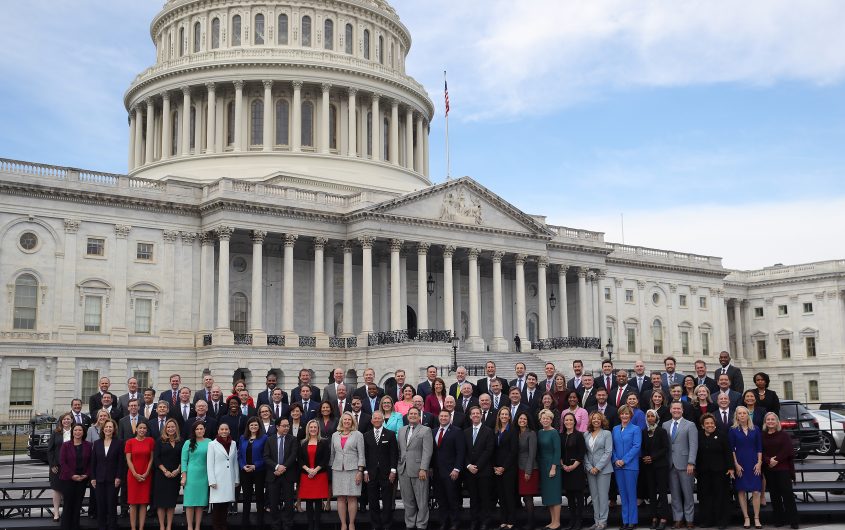
Win McNamee/Getty Images
Europe Faces Open Doors but Uphill Battles with New Congress

Niklas Helwig
Niklas Helwig was a DAAD/AICGS Research Fellow in October and November 2018. Prior to his research stay at the AICGS, he was a Transatlantic Post-Doc Fellow for International Relations and Security (TAPIR fellow). He was based at the RAND Corporation and the Center for Transatlantic Relations in DC, as well as at the German Institute for International and Security Affairs (SWP) in Berlin. Between 2014 and 2016. he worked as Senior Research Fellow at the Finnish Institute of International Affairs in Helsinki. Dr. Helwig was also a Visiting Researcher at the Centre for European Policy Studies in Brussels. He researched and taught at the University of Cologne and the University of Edinburgh, from where he received a double PhD (‘co-tutelle’). Dr. Helwig was a Marie Curie Early Stage Researcher in the Initial Training Network on EU external action (EXACT).
Dr. Helwig’s research interests include Germany’s foreign and security policy, European defense cooperation, transatlantic security cooperation, as well as the EU as a Global Actor. He wrote extensively for think tanks, online blogs, and academic journals, including European Foreign Affairs Review, The International Spectator, Internationale Politik und Gesellschaft, Huffington Post, EurActiv, and War on the Rocks.
During his time at the AICGS, Dr. Helwig analyzes U.S. domestic perception of the transatlantic alliance during the 2018 midterm elections. Lately, the U.S. administration emphasized a transactional perspective on the relationship with its allies. Historically, however, it can be argued that the transatlantic alliance was about more than economic prosperity and mutual defense, and instead based on a broader societal belief in shared values and identity. By analyzing the debates around midterm races across the U.S., the project aims to shed light on the question whether this notion still holds true in today’s America.
Additionally, he was a 2017-2018 participant in AICGS’ project “A German-American Dialogue of the Next Generation: Global Responsibility, Joint Engagement,” sponsored by the Transatlantik-Programm der Bundesrepublik Deutschland aus Mitteln des European Recovery Program (ERP) des Bundesministeriums für Wirtschaft und Energie (BMWi).
“The U.S. is bigger than the White House,” declared German foreign minister Heiko Maas in a recent interview. In response to President Trump’s well-documented ambivalence toward alliances, German leaders are increasingly reaching out to lawmakers in Congress and other counterparts around the country. That is one of the reasons why Berlin and other European capitals will be closely watching as the new Congress starts its work in January.
A lot of hope rests on the shoulders of the Democrats who won in November, taking control of the House. While many Democrats remain critical of President Trump’s treatment of allies, it is still too early to conclude what effect the new Congress will have on the transatlantic alliance. And while the Democrats agree with Europeans on the principle of the need for a strong transatlantic partnership, disagreement on the substance is looming.
While the Democrats agree with Europeans on the principle of the need for a strong transatlantic partnership, disagreement on the substance is looming.
First, the good news. It looks like Europeans will have many more opportunities to make their case. Eliot Engel (D-NY),the incoming chairman of the House Foreign Affairs Committee, said in a recent Reuters interview, “I think what we should do is try to repair the damage with our alliances that has been done.” Reaching out to allies allows Democrats to showcase how their foreign policy differs from Trump’s vision of “America First.”
Sometimes even a change of the person holding the gavel can make a huge difference. Observers see the failed reelection bid of Dana Rohrabacher, the current Republican chairman of the Subcommittee on Europe, as a positive development. Rohrabacher is a controversial figure even within his own party because of his sympathetic views on Russian leadership. On issues concerning Europe, such as the Ukraine crisis or democratic backsliding in Poland and Hungary, he stood on the brakes instead of scheduling hearings.
So, a change in atmosphere is palpable. On the substance, however, it looks as though European representatives will continue to face an uphill battle in Congress. Take Iran as an example. It is unclear whether the new Democratic majority in the House can or will help Europeans in their quest to save the nuclear agreement from falling apart. It would be very difficult under any circumstances to rein in the U.S. administration on its policies toward an agreement that was never ratified by Congress. The Iran nuclear deal is an especially toxic issue for lawmakers to handle.
While Democrats criticized Trump for his unilateral move to leave the agreement and reimpose sanctions, keeping a tough line against Iran is a far more bipartisan view in the U.S. than many in Europe realize. Among Democrats, four senators and nineteen representatives voted against the Iran deal in 2015, including the incoming committee chairman Engel. It is unlikely that many Democrats will join Europeans and follow the politically risky and electorally unrewarding strategy of advocating for a softer approach to the Iranian regime.
Europeans should also not expect rapprochement on the everlasting discussion on European military expenditures. On the plus side, the overwhelming majority in Congress, Democrats and Republicans alike, strongly support U.S. commitments to NATO. Democrats and Republicans are even proposing legislation that would tie the president’s hand if he were to inclined to leave NATO or any other international organization.
The view that Europeans should pay more for their own defense is a strongly held bipartisan belief.
However, the view that Europeans should pay more for their own defense is a strongly held bipartisan belief. It is even conceivable that the Democratic House could lead to a more heated discussion on transatlantic burden-sharing. During the election campaign many of this year’s Democratic candidates, including a host of former veterans, spoke critically of an unchecked expansion of the U.S. military role. The incoming chairman of the Armed Services Committee, Adam Smith (D-WA), lamented how lawmakers had the tendency to rubberstamp the Pentagon’s requests for budget increases in recent years.
The debate on future U.S. defense budgets is only just starting. A recent report by the national defense strategic commission concluded that higher defense expenditure is needed in order to meet the objectives of the national defense strategy. Democrats in Congress will push for priorities in future budgets and already took aim at President Trump’s proposal for a space force and the costly nuclear forces overhaul. It is unlikely that Democrats will argue for a scale-back of the U.S. presence in Europe. However, it is also questionable whether Democrats will have much sympathy for European countries that struggle to meet the NATO 2 percent target.
Russia is a crucial area where pushback by Democrats against President Trump might have unintended consequences for transatlantic relations. The president’s alleged ties to the Kremlin and exposed Russian efforts of election meddling provide an excellent opportunity for the Democrats to create an image of a tough party that stands up for American interests and integrity in a hostile world. Efforts to dial up Congress’ investigative efforts into Trump’s Russia connection are widely expected. However, what might be a good strategy for the Democrats in the partisan competition against the president does not have to be a smart response to Russia’s malign action.
Some European partners, including Germany, France, and Austria, are critical of the tough sanctions policy against Russia that Congress has driven in recent years. European representatives rushed to the Hill in 2017 to lobby for a toned-down version of the sanctions bill that effectively threatened companies involved in the Nord Stream II pipeline extension between Germany and Russia. But Democrats together with Republicans are contemplating hitting Russia even harder, targeting Russian debt and international bank transactions. Several bills are already in preparation and the extensive “Defending American Security from Kremlin Aggression Act” is expected to pass through Congress with ease.
While it seems as if the proposed legislation will not have extraterritorial effects on European businesses dealing with Russia, it will remain crucial for Europeans to continue to make the case for a robust but measured approach in the deterrence against the Kremlin. Namely, a sanctions policy that is not driven by the U.S. domestic conversation and instead guided by a coordinated international response to Russian activities.
In principle, there is much for Europe to like in the fact that Democrats control the House. Proposed initiatives, such as an investigation into the mismanagement of the State Department, show the value that Democrats assign to diplomacy. However, on the substance, Democrats often cannot afford to look soft. Europeans must keep this in mind in their engagement with the incoming Congress.
Supported by the DAAD with funds from the Federal Foreign Office (FF).








